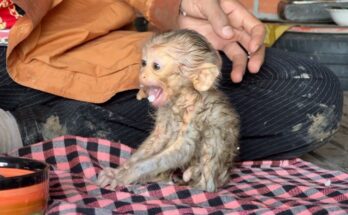Deep in the wild lands of Tanzania, the Hadzabe tribe continues to live much like their ancestors did thousands of years ago—off the land, with no modern farming or electricity. Among their most traditional meals is the preparation of monkey meat, served either roasted over an open flame or boiled into a hearty soup. This food, though shocking to outsiders, is an important part of the Hadzabe’s survival and culture.
Early in the day, Hadzabe hunters set off with homemade bows and poisoned arrows, tracking monkeys through the rocky hills and dense bushes. The hunt demands stealth, patience, and sharp instinct. Once successful, they return to the camp, where the women and children gather to begin the cooking process.
Roasting is a favorite method. The monkey is carefully cleaned and placed directly over the open fire, slowly turned by hand. The smoky aroma spreads through the air, mixing with laughter and chatter from the tribe. The meat becomes crisp on the outside, locking in flavors that many Hadzabe say are richer than goat or antelope. It’s a rare treat, enjoyed especially after a successful hunt.
For soup, the monkey meat is chopped into smaller pieces and boiled in a clay pot with simple ingredients like wild roots, tubers, and herbs collected from the forest. The broth becomes thick, nutritious, and deeply flavorful. Elders often prefer this method, saying it gives strength and is easier to eat for those with fewer teeth.
These meals are more than just food—they are moments of bonding, storytelling, and tradition. For the Hadzabe, monkey roaster and soup are part of a bigger story of survival, respect for nature, and ancestral knowledge. It’s not just about eating—it’s about remembering who they are and where they come from.


